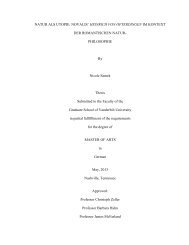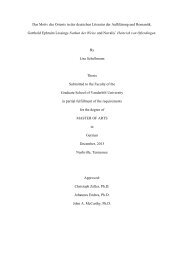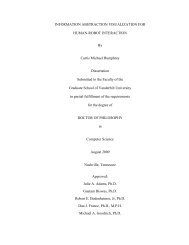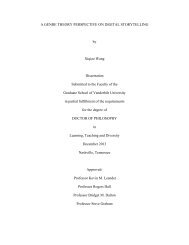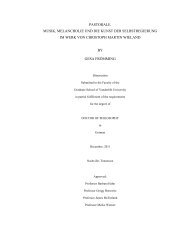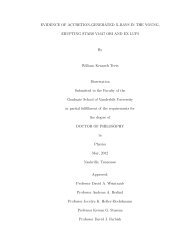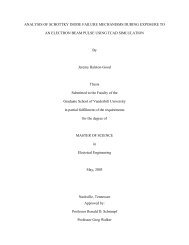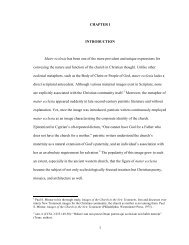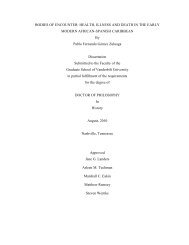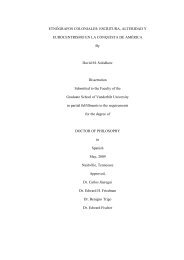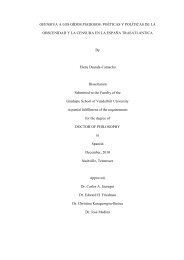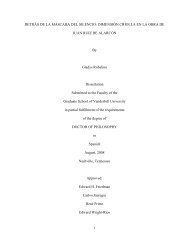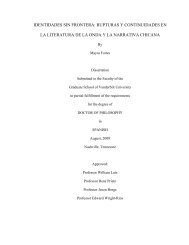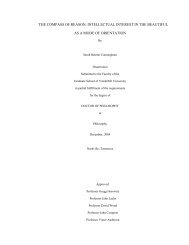THE DEATH OF DIONYSOS - ETD - Vanderbilt University
THE DEATH OF DIONYSOS - ETD - Vanderbilt University
THE DEATH OF DIONYSOS - ETD - Vanderbilt University
You also want an ePaper? Increase the reach of your titles
YUMPU automatically turns print PDFs into web optimized ePapers that Google loves.
to Mariane as he describes his childhood reading from Jerusalem Delivered: “‘Ich konnte<br />
nie die Worte aussprechen: “Allein das Lebensmaß Chlorindens ist nun voll, / Und ihre<br />
Stunde kommt, in der sie sterben soll”, daß mir nicht die Tränen in die Augen kamen, die<br />
reichlich flossen’” (27). [“‘I could never, without tears coming to my eyes, utter the<br />
words: “But now the measure of Clorinda’s days is full / The hour draws near, the hour<br />
when she must die”’” (EAB 12).] Wilhelm’s tears are the emblem of his identification<br />
with the tragic heroine. What is more, in the Lehrjahre such affective experience of art is<br />
not limited to drama. In Book Two sexual frustration leaves Wilhelm in vexed agitation<br />
(“[i]n der verdrießlichen Unruhe”); he finds peace at last only as he listens to the dark<br />
songs of the Harfner:<br />
Wilhelm stand an dem Pfosten, seine Seele war tief gerührt, die Trauer des<br />
Unbekannten schloß sein beklommenes Herz auf; er widerstand nicht dem<br />
Mitgefühl und konnte und wollte die Tränen nicht zurückhalten, die des<br />
Alten herzliche Klage endlich auch aus seinen Augen hervorlockte. Alle<br />
Schmerzen, die seine Seele drückten, lösten sich zu gleicher Zeit auf, er<br />
überließ sich ihnen ganz [. . .] (137, my italics).<br />
[Wilhelm stood by the door, deeply moved, his own constricted heart<br />
opened up by the immense grief of the stranger. He was overcome by such<br />
fellow feeling that he did not, could not, restrain the tears brought to his<br />
eyes by the old man’s bitter lamentation. The sorrows oppressing his heart<br />
all came out into the open. He abandoned himself completely to them (. . .)<br />
(EAB 78, my italics).]<br />
Listening to the harpist, Wilhelm feels the same eleos (“Mitgefühl”, i.e. pity) to which<br />
Aristotle had ascribed in part the power of tragedy: an experience made possible only if<br />
the audience identified with the tragic fate of the hero. Wilhelm is receptive to the old<br />
man’s songs, because his own frustrated desire lets him sympathize with the voice behind<br />
their hopeless content.<br />
Nonetheless, by the time Serlo offers him the title role in Hamlet, Wilhelm has an<br />
altered view of acting and the stage. Explaining to Werner his decision to become an<br />
actor, he writes: “‘mich selbst, ganz wie ich da bin, auszubilden, das war dunkel von<br />
Jugend auf mein Wunsch und meine Absicht’” (290). [“‘Even as a youth I had the vague<br />
without the important intermediary figure, Friedrich Schiller. I consider the latter’s categories of<br />
beauty, a schmelzende Schönheit and an anspannende Schönheit (a “melting” and a “rigidifying”<br />
beauty), to be an anticipation of Nietzsche’s categories of tragedy. Nevertheless, Goethe and<br />
Schiller clearly preferred the enobling character of what Nietzsche would loathe as the Apollonian<br />
drama of Euripides.<br />
9



